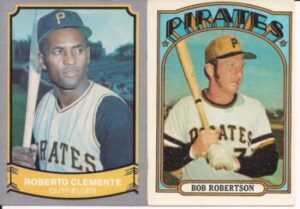If you’re a regular reader of my articles or a listener of my podcasts, you know that I’ve covered some of the great MLB dynasties. The New York Yankees, the St. Louis Cardinals, the 1970s Cincinnati Reds, and the early 1970s Oakland A’s, to name a few.
Today I’d like to talk about the Pittsburgh Pirates. I know the Pirates have never had a dynasty, but they won two World Series during the 1970s—one in 1971 and the other in 1979.
Brief History of Pittsburgh Pirates
The Pirates baseball team goes back to 1882 when they were a part of the American Association League. Pittsburgh joined the National League in 1887 but was not named the Pirates until 1891. From 1982 through 1890, they were known as the Pittsburgh Alleghenys.
In 1901 and 1902, the Pirates were crowned the National Leagues Champions by having the best record. In 1903 they played in the first World Series but lost to the Boston Americans. The Pirates won their first World Series in 1909, defeating the Detroit Tigers. They would not play in the World Series again until 1925, beating the Washington Senators. Two years later, they played in the World Series again, but they were swept by the Yankees four games to zero.
It wasn’t until 1960 that the Pirates would play in the World Series again, defeating the powerful New York Yankees four games to three despite getting outscored 55 to 27.
Pittsburgh finished first in their division in 1970, but they were no match for the Reds in the NLCS, losing three games to zero. But the team was loaded with talented players, and Pirates fans had high hopes for the 1971 season.
Introduction To The 1971 Pittsburgh Pirates
The 1971 Pirates had a mixture of veterans and young players. In the outfield, they had future Hall of Famer Roberto Clemente, who was playing as well as ever despite his 37 years of age. Clemente finished the season with an impressive .341 batting average.
Joining him in the outfield was another future Hall of Famer, 31-year-old Willie Stargell, who led the team in RBIs with 125. Stargell also led the team and the league with 48 homeruns. Although no longer in his prime, 35-year-old second baseman Bill Mazeroski would also find his place in Cooperstown and was a valuable asset as a team leader.
Mazeroski and Clemente were the only remaining players from the 1960 World Championship team.

1971 Pittsburgh Pirates Lineup
At first base, the Pirates had Bill Robertson, who belted 26 home runs, second most on the team. Dave Cash played outstanding defense at second base while posting a .289 batting average for the season. While not much of a threat at the plate, Gene Alley played exceptional defense at shortstop. Richie Hebner was steady at third base, batting .271 with 17 home runs. Joining Clemente and Stargell in the outfield was centerfielder Al Oliver who batted .282 on the season.
Behind the plate was Manny Sanguillen, who batted .319 with 81 RBIs. Dock Ellis and Steve Blass led the pitching staff. Ellis finished the season with a 19–9 record and a 3.06 ERA. Blass won 15 games and had a 2.85 ERA. Manager Danny Murtaugh hoped to help the team win its second World Championship since he took over as the skipper in 1957.
A New Stadium and A Playoff Birth
1971 would be the Pirates’ first entire season playing in their new home, Three Rivers Stadium. The team had an outstanding regular season, finishing with 97 wins and 65 losses, the best record in the National League.
The Pirates would play the SF Giants in the NLCS to determine which team would play the powerful Baltimore Orioles in the World Series. After losing the first game, the Pirates won the next three to win the NL pennant.

1971 MLB World Series
Now it was on to Baltimore to face the defending World Champion Orioles. The Orioles had the best record in MLB, and they had just swept the mighty Oakland A’s in the ALCS. Baltimore had 24 hits in the first two games and outscored the Pirates 16–6. But Pittsburgh didn’t get this far by giving up.
In game three, Pitcher Steve Blass pitched a complete game and allowed only three hits. Pirates first baseman Bill Robertson hit a three-run home run after missing the bunt sign. The final score was Pittsburgh 5, and Baltimore 1.
The first night game in World Series history took place in game four. The Orioles took a 3–0 lead in the first inning, but after that, it was all Pirates, who had fourteen hits and won 4–3.
Nelson Briles was Manager Murtough’s choice as the game-five starting pitcher. It was a questionable choice as Briles had spent most of the season as a relief pitcher and had not played in the NLCS against the Giants. But Murtaugh must have known what he was doing as Briles went out there and pitched a complete game two-hitter, and the Pirates won 4–0.
Murtough faced another tough decision in game six; with Dock Ellis injured and Steve Blass not fully rested, he chose reliever Bob Moose as the starting pitcher. Moose pitched well, but the Orioles pulled out a 3–2 victory in extra innings.
In game seven, Steve Blass pitched his second complete game of the series and allowed only four hits. Led by Series MVP Roberto Clemente, who hit a home run in the fourth inning, the Pirates won 2–1 capturing their fourth World Championship in team history.
Join me again next week for part two, when I’ll talk about how the rest of the 1970s went for the Pirates.
Mark Morthier is the host of Yesterday’s Sports, a podcast dedicated to reliving memorable sports moments from his childhood days and beyond. He grew up in New Jersey just across from New York City, so many of his episodes revolve around the great sport’s teams of the 70s for the New York area.
He is also an author of No Nonsense, Old School Weight Training (Second Edition): A Guide for People with Limited Time and Running Wild: (Growing Up in the 1970s)

Check out Mark's Books Below
Please Note – As an Amazon Associate I earn from qualifying purchases
Resources
More From Yesterday's Sports
1972 Olympics Revisited (Weightlifting Medal Winners)
Weightlifting at the 1972 Olympics occurred in Munich, Germany, from...
Read More1968 Olympics Revisited (Weightlifting Medal Winners)
The 1968 Olympics were held in Mexico City in October....
Read More1968 Detroit Tigers (A Historic Championship Season)
With baseball season in full swing, I thought I’d take...
Read More(4 All-Time Weightlifting Greats) Paul Anderson, Tommy Kono, Ken Patera, and Naim Süleymanoğlu
Here’s a quick look at some of the accomplishments of...
Read More





